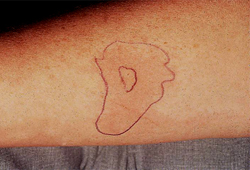Summary
Definition
História e exame físico
Principais fatores diagnósticos
- occupational exposure to sensitizing agents or irritants
- symptoms of asthma that improve during holidays
- initial onset of asthma symptoms during a work period
Fatores de risco
- high-level exposure to sensitizer
- atopy
- genetic factors
- smoking
Investigações diagnósticas
Primeiras investigações a serem solicitadas
- spirometry
- chest x-ray
- skin prick testing (SPT)
- nonspecific bronchial hyper-responsiveness (NSBHR)
- serial peak expiratory flow (PEF)
Investigações a serem consideradas
- specific serum IgE assay
- specific inhalation challenge (SIC)
Novos exames
- induced sputum cytology
- fractional exhaled nitric oxide (FeNO)
Algoritmo de tratamento
sensitizer-induced
irritant-induced
symptomatic asthma
Colaboradores
Autores
Ryan Hoy, MB BS, MOEH, FRACP

Respiratory Physician
The Alfred Hospital
Melbourne
Victoria
Australia
Declarações
RH is an author of a reference cited in the topic.
Susan M. Tarlo, MB BS FRCP(C)

Professor of Medicine
University of Toronto
Respiratory Physician
Toronto Western Hospital
Toronto
Ontario
Canada
Declarações
SMT has received grant support from the Ontario Workplace Safety and Insurance Board (WSIB) and the Centre for Research Expertise in Occupational Disease (funded by Ontario Ministry of Labour). She has acted as a consultant for the Ontario Workplace Safety and Insurance Appeals Tribunal (WSIAT) and has provided clinical case assessments for WSIB. She has been a member of Task Forces for the European Academy of Allergy, Asthma and Clinical Immunology and an expert advisor to a committee of the European Respiratory Society. She is a member of the Occupational Disease Committee of the American Academy of Allergy, Asthma and Clinical Immunology (AAAAI). She has been an invited speaker at meetings of AAAAI and the American Thoracic Society. She is a coeditor of Current Opinion in Allergy and Clinical Immunology, and has received book royalties as coeditor of Asthma in the Workplace. SMT is an author of references cited in the topic.
Revisores
Ware Kuschner, MD
Associate Professor of Medicine
Stanford University
Stanford
Staff Physician
US Department of Veterans Affairs
Palo Alto Health Care System
Palo Alto
CA
Declarações
WK declares that he has no competing interests.
Karin Pacheco, MD
Associate Professor of Medicine
National Jewish Medical Centre
Denver
CO
Declarações
KP declares that she has no competing interests.
Philip Harber, MD
Professor of Medicine
University of California
Los Angeles
CA
Declarações
PH declares that he has no competing interests.
Créditos aos pareceristas
Os tópicos do BMJ Best Practice são constantemente atualizados, seguindo os desenvolvimentos das evidências e das diretrizes. Os pareceristas aqui listados revisaram o conteúdo pelo menos uma vez durante a história do tópico.
Declarações
As afiliações e declarações dos pareceristas referem--se ao momento da revisão.
Referências
Principais artigos
Barber CM, Cullinan P, Feary J, et al. British Thoracic Society clinical statement on occupational asthma. Thorax. 2022 May;77(5):433-42.Texto completo Resumo
Tarlo SM, Balmes J, Balkissoon R, et al. Diagnosis and management of work-related asthma: American College Of Chest Physicians Consensus statement. Chest. 2008 Sep;134(3 suppl):1S-41S. Resumo
Baur X, Sigsgaard T, Aasen TB, et al. Guidelines for the management of work-related asthma. Eur Respir J. 2012 Mar;39(3):529-45.Texto completo Resumo
Global Initiative for Asthma (GINA). Global strategy for asthma management and prevention. May 2025 [internet publication].Texto completo
American College of Radiology. ACR appropriateness criteria: occupational lung diseases. 2019 [internet publication].Texto completo
Artigos de referência
Uma lista completa das fontes referenciadas neste tópico está disponível para os usuários com acesso total ao BMJ Best Practice.

Diagnósticos diferenciais
- Work-exacerbated asthma
- Occupational eosinophilic bronchitis
- Coincidental nonoccupational asthma
Mais Diagnósticos diferenciaisDiretrizes
- Global strategy for asthma management and prevention
- Asthma: diagnosis, monitoring and chronic asthma management (BTS, NICE, SIGN)
Mais DiretrizesFolhetos informativos para os pacientes
Asthma in adults
Mais Folhetos informativos para os pacientesConectar-se ou assinar para acessar todo o BMJ Best Practice
O uso deste conteúdo está sujeito ao nosso aviso legal